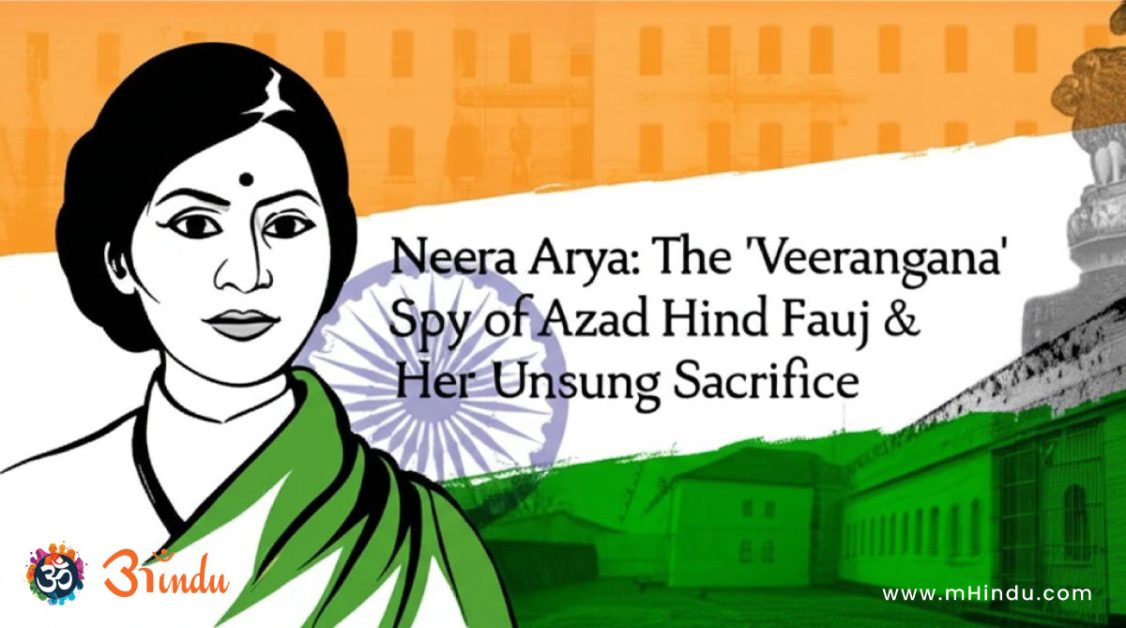
In the era of India’s freedom struggle, many brave souls have sacrificed their lives, often remaining unsung. Among them shines the extraordinary story of Neera Arya, a ‘veerangana’ whose courage and dedication to the motherland remain a testament to unwavering patriotism. In a time when the fight for ‘swaraj’ consumed the nation, Neera Arya, a woman of deep conviction and unwavering resolve, chose a path less traveled. Her story, a powerful narrative of sacrifice, resilience, and unwavering dedication to the cause of Indian independence, resonates deeply within the heart of Sanatan Dharma, where the strength of a ‘nari shakti’ is revered. This blog delves into the life of Neera Arya, exploring her journey as the first female spy of the Azad Hind Fauj, her unwavering commitment to Netaji Subhash Chandra Bose, and the immense personal sacrifices she endured for the nation.
Explore Blog Content
ToggleNeera Arya: A Life of Nationalism and Sacrifice
Born on March 5, 1902, in Khekra Nagar, Uttar Pradesh, Neera Arya was raised in a family of distinguished businessman Seth Chhajumal. From her early years, she displayed a fervent nationalist spirit, a burning desire to contribute to the freedom movement. Her father’s flourishing business in Calcutta provided her with a rich educational environment, where she mastered several languages, including Bengali, Hindi, and English. This linguistic versatility would later prove invaluable in her role as a spy.
Marriage and the Clash of Ideologies
Neera’s marriage to Shrikant Jairanjan Das, a CID inspector in British India, marked a turning point in her life. This union placed her at the crossroads of two diametrically opposed ideologies: her unwavering nationalism and her husband’s loyalty to the British Raj. Despite the personal conflict, Neera’s commitment to the freedom struggle remained unshaken.
Joining the Azad Hind Fauj: A Spy’s Journey
Driven by her patriotic zeal, Neera Arya joined the Jhansi Regiment of the Azad Hind Fauj, a move that solidified her role as a formidable spy. The British government viewed this regiment with suspicion, believing it to be a hub of espionage. Neera’s dedication to Netaji Subhash Chandra Bose and the cause of ‘purna swaraj’ was unwavering.
The Sacrifice and the ‘Naagin’ Title
The pivotal moment in Neera’s life came when her husband, under British orders, was tasked with assassinating Netaji Subhash Chandra Bose. Neera, torn between her marital duty and her loyalty to the nation, made a heart-wrenching decision. When Jairanjan Das attempted to assassinate Netaji, Neera intervened, stabbing her husband to death to protect the leader of the Azad Hind Fauj. This act, while born of necessity, earned her the moniker “Naagin” from Netaji himself, a testament to her fierce protectiveness.
Kalapani: A Testament to Resilience
Following the surrender of the Azad Hind Fauj, Neera Arya faced trial at the Red Fort. While many prisoners were released, Neera was sentenced to ‘Kalapani,’ the dreaded cellular jail in the Andaman Islands. There, she endured unimaginable torture, enduring physical and mental anguish.
- The Trials of Kalapani: The harsh conditions and brutal treatment she faced in Kalapani tested her resolve, yet her spirit remained unbroken.
- Refusal to Betray Netaji: Despite extreme torture, she refused to divulge any information about Netaji’s whereabouts, embodying the spirit of unwavering loyalty.
Neera Arya Autobiography and the Testimony of Farhana Taj
Neera Arya autobiography, along with accounts from Urdu writer Farhana Taj, provides a poignant glimpse into her harrowing experiences. Her descriptions of the trials in Kalapani, the physical and emotional torture, and her unwavering spirit are deeply moving.
- The Blanket Incident: An incident where a guard threw blankets at her, a moment of unexpected kindness amidst brutality.
- The Blacksmith’s Torture: The excruciating pain of having her chains removed, where she was deliberately hurt by the blacksmith.
- The Jailer’s Cruelty: The jailer’s attempt to break her spirit by demanding information about Netaji, and the horrific torture she endured, including the attempt to remove her breast with a ripper.
Neera Arya’s Influence from Great Leaders
Neera’s unwavering dedication and courage were undoubtedly influenced by the powerful leadership and ideals of Netaji Subhash Chandra Bose. Netaji’s call for “Give me blood, and I will give you freedom” resonated deeply with her, inspiring her to make extraordinary sacrifices for the nation. Furthermore, the strong sense of duty and sacrifice prevalent in Hindu scriptures, particularly the Bhagavad Gita’s emphasis on ‘dharma’ and ‘karma,’ likely shaped her moral compass. The ideals of Rani Lakshmibai, another iconic ‘veerangana’ who fought valiantly against the British, would have also been a source of inspiration, reinforcing her belief in the strength and capability of women in the freedom struggle.
The Unsung Heroine: A Life of Austerity
Despite her immense contributions, Neera Arya lived a life of austerity, selling flowers and residing in a small cottage in Falaknuma, Hyderabad. Even her humble dwelling was eventually demolished by the government. Her life, marked by sacrifice and neglect, underscores the tragic reality of many unsung heroes of the freedom struggle.
The Enduring Legacy of Neera Arya
Neera Arya passed away on July 26, 1998, leaving behind a legacy of unparalleled courage and sacrifice. Her story, though often overlooked, serves as a powerful reminder of the countless individuals who dedicated their lives to India’s freedom.
Conclusion: A Call to Remember ‘Veeranganas’
Neera Arya’s story, a testament to the unwavering spirit of ‘nari shakti,’ serves as a powerful reminder of the sacrifices made for India’s freedom. Her courage and dedication resonate deeply with the values of Sanatan Dharma, which honors the strength and resilience of women. As we remember Neera Arya, let us also reflect on the countless other unsung heroes who contributed to our nation’s independence. In the spirit of ‘dharma,’ let us strive to honor their memory and ensure their stories are never forgotten.
FAQs Section
- How did Neera Arya contribute to the Indian freedom struggle?
Neera Arya played a crucial role by serving as a spy in the Azad Hind Fauj, providing vital intelligence and protecting Netaji Subhash Chandra Bose. Her unwavering dedication and bravery made her an invaluable asset to the freedom movement. - What sacrifices did Neera Arya make for India?
Neera Arya made immense sacrifices, including killing her husband to save Netaji, enduring brutal torture in Kalapani, and living a life of poverty after independence. Her actions were driven by a deep love for her country. - Where was Neera Arya imprisoned?
Neera Arya was imprisoned in the Cellular Jail in the Andaman Islands, known as ‘Kalapani,’ a place notorious for its harsh conditions and brutal treatment of political prisoners. - What was Neera Arya’s role in the Azad Hind Fauj?
She was a key member of the Jhansi Regiment, serving as a spy and dedicated to protecting Netaji. Her intelligence and courage were vital to the Fauj’s operations. - How did Neera Arya protect Netaji Subhash Chandra Bose?
She protected Netaji by killing her husband, who was under British orders to assassinate him, showing her ultimate loyalty to Netaji and the freedom movement. - What was the result of Neera Arya’s Trial?
Following the surrender of the Azad Hind Fauj, Neera Arya was tried at the Red Fort and sentenced to ‘Kalapani’ for the murder of her husband, despite her actions being driven by her dedication to saving Netaji Subhash Chandra Bose. - What did Netaji Subhash Chandra Bose call Neera Arya?
Netaji Subhash Chandra Bose, acknowledging her fierce protectiveness and the circumstances of her actions, referred to her as “Naagin.” This title reflected her powerful and unwavering loyalty. - Where did Neera Arya live after her release?
After her release from Kalapani, Neera Arya lived a life of austerity and hardship, selling flowers and residing in a small, humble cottage in Falaknuma, Hyderabad, demonstrating her continued dedication to a simple life.







